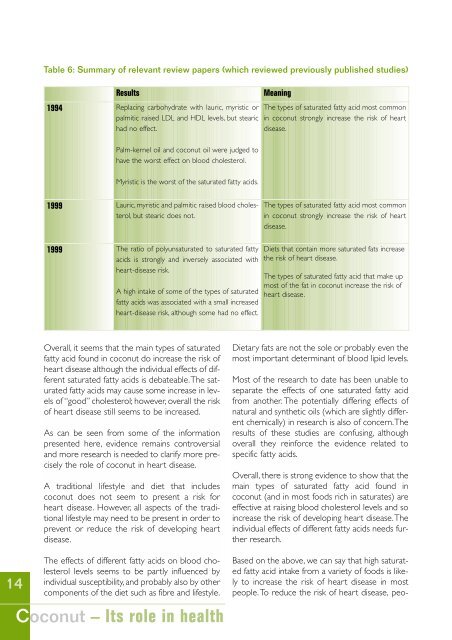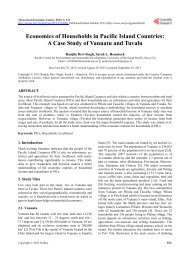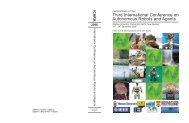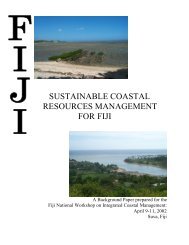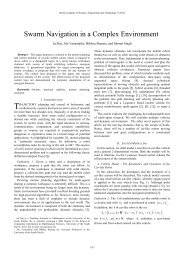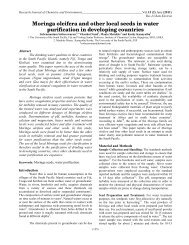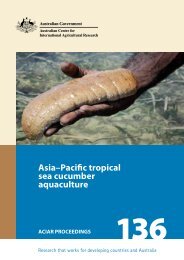Coconut - Secretariat of the Pacific Community
Coconut - Secretariat of the Pacific Community
Coconut - Secretariat of the Pacific Community
You also want an ePaper? Increase the reach of your titles
YUMPU automatically turns print PDFs into web optimized ePapers that Google loves.
14<br />
Table 6: Summary <strong>of</strong> relevant review papers (which reviewed previously published studies)<br />
1994<br />
1999<br />
1999<br />
Results Meaning<br />
Replacing carbohydrate with lauric, myristic or<br />
palmitic raised LDL and HDL levels, but stearic<br />
had no effect.<br />
Palm-kernel oil and coconut oil were judged to<br />
have <strong>the</strong> worst effect on blood cholesterol.<br />
Myristic is <strong>the</strong> worst <strong>of</strong> <strong>the</strong> saturated fatty acids.<br />
Lauric, myristic and palmitic raised blood cholesterol,<br />
but stearic does not.<br />
The ratio <strong>of</strong> polyunsaturated to saturated fatty<br />
acids is strongly and inversely associated with<br />
heart-disease risk.<br />
A high intake <strong>of</strong> some <strong>of</strong> <strong>the</strong> types <strong>of</strong> saturated<br />
fatty acids was associated with a small increased<br />
heart-disease risk, although some had no effect.<br />
Overall, it seems that <strong>the</strong> main types <strong>of</strong> saturated<br />
fatty acid found in coconut do increase <strong>the</strong> risk <strong>of</strong><br />
heart disease although <strong>the</strong> individual effects <strong>of</strong> different<br />
saturated fatty acids is debateable.The saturated<br />
fatty acids may cause some increase in levels<br />
<strong>of</strong> “good” cholesterol; however, overall <strong>the</strong> risk<br />
<strong>of</strong> heart disease still seems to be increased.<br />
As can be seen from some <strong>of</strong> <strong>the</strong> information<br />
presented here, evidence remains controversial<br />
and more research is needed to clarify more precisely<br />
<strong>the</strong> role <strong>of</strong> coconut in heart disease.<br />
A traditional lifestyle and diet that includes<br />
coconut does not seem to present a risk for<br />
heart disease. However, all aspects <strong>of</strong> <strong>the</strong> traditional<br />
lifestyle may need to be present in order to<br />
prevent or reduce <strong>the</strong> risk <strong>of</strong> developing heart<br />
disease.<br />
The effects <strong>of</strong> different fatty acids on blood cholesterol<br />
levels seems to be partly influenced by<br />
individual susceptibility, and probably also by o<strong>the</strong>r<br />
components <strong>of</strong> <strong>the</strong> diet such as fibre and lifestyle.<br />
<strong>Coconut</strong> – Its role in health<br />
The types <strong>of</strong> saturated fatty acid most common<br />
in coconut strongly increase <strong>the</strong> risk <strong>of</strong> heart<br />
disease.<br />
The types <strong>of</strong> saturated fatty acid most common<br />
in coconut strongly increase <strong>the</strong> risk <strong>of</strong> heart<br />
disease.<br />
Diets that contain more saturated fats increase<br />
<strong>the</strong> risk <strong>of</strong> heart disease.<br />
The types <strong>of</strong> saturated fatty acid that make up<br />
most <strong>of</strong> <strong>the</strong> fat in coconut increase <strong>the</strong> risk <strong>of</strong><br />
heart disease.<br />
Dietary fats are not <strong>the</strong> sole or probably even <strong>the</strong><br />
most important determinant <strong>of</strong> blood lipid levels.<br />
Most <strong>of</strong> <strong>the</strong> research to date has been unable to<br />
separate <strong>the</strong> effects <strong>of</strong> one saturated fatty acid<br />
from ano<strong>the</strong>r. The potentially differing effects <strong>of</strong><br />
natural and syn<strong>the</strong>tic oils (which are slightly different<br />
chemically) in research is also <strong>of</strong> concern.The<br />
results <strong>of</strong> <strong>the</strong>se studies are confusing, although<br />
overall <strong>the</strong>y reinforce <strong>the</strong> evidence related to<br />
specific fatty acids.<br />
Overall, <strong>the</strong>re is strong evidence to show that <strong>the</strong><br />
main types <strong>of</strong> saturated fatty acid found in<br />
coconut (and in most foods rich in saturates) are<br />
effective at raising blood cholesterol levels and so<br />
increase <strong>the</strong> risk <strong>of</strong> developing heart disease.The<br />
individual effects <strong>of</strong> different fatty acids needs fur<strong>the</strong>r<br />
research.<br />
Based on <strong>the</strong> above, we can say that high saturated<br />
fatty acid intake from a variety <strong>of</strong> foods is likely<br />
to increase <strong>the</strong> risk <strong>of</strong> heart disease in most<br />
people.To reduce <strong>the</strong> risk <strong>of</strong> heart disease, peo-


